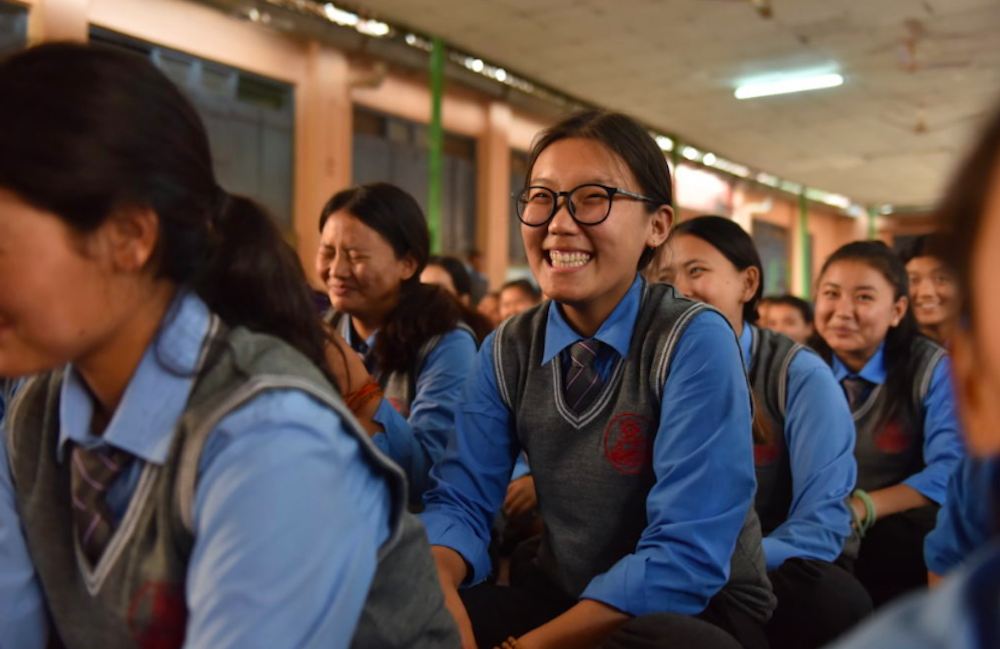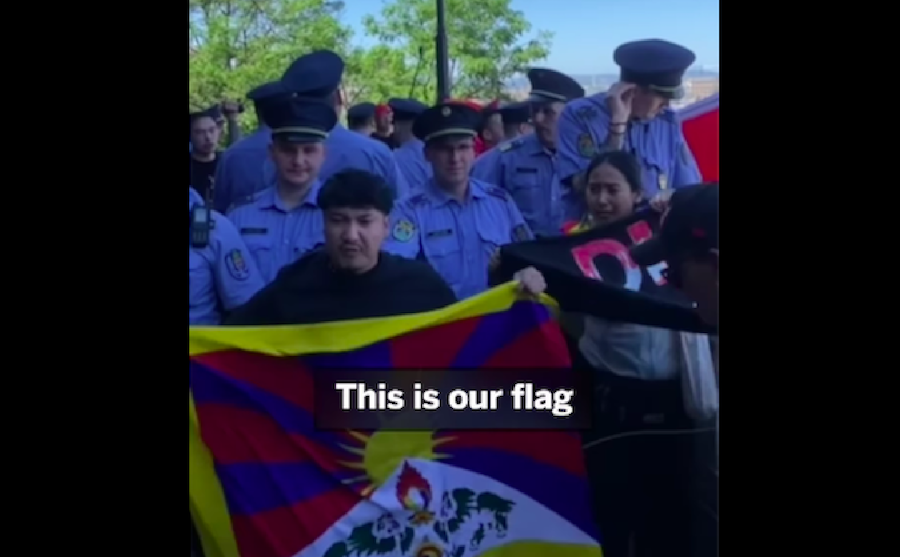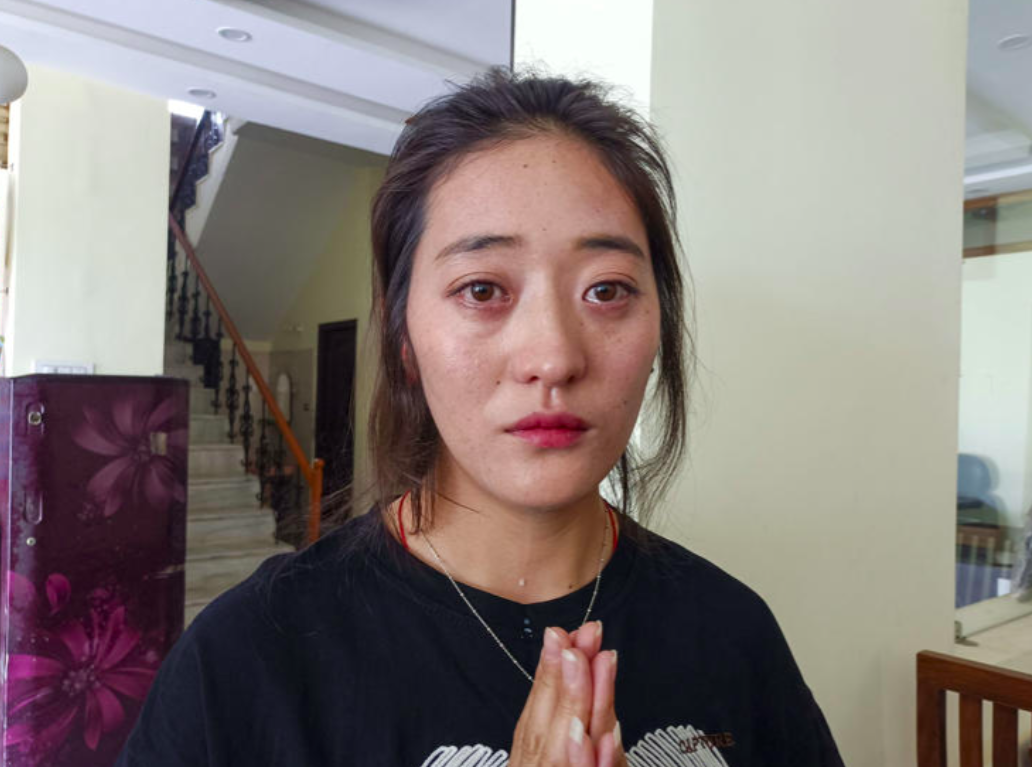MELISSA BLOCK, host: At age 26, Tibetan independence activist and Buddhist nun Ngawang Sangdrol has spent nearly half her life in prison where she endured severe beatings. Sangdrol drew international attention after a tape of songs she and 13 other nuns had recorded was smuggled out of the notorious Drapchi Prison in the Tibetan capital Lhasa. Suffering from severe headaches and other illnesses, she was paroled on medical grounds last October and allowed to leave China last week. And she came by our studios to talk about her experience. Ngawang Sangdrol is tiny with a long ponytail and delicate hands. Speaking through an interpreter, she recalled why she was first detained at age 13.
Ms. NGAWANG SANGDROL: (Through Translator) It was because we had shouted slogans of saying, `Free Tibet. Long live his holiness, the Dalai Lama!’ And it’s because of that they detained us.
BLOCK: You were just 13. That’s very young to be politically active.
Ms. SANGDROL: (Through Translator) I may be young at the age of 13 to know what political activism is, but I was brought up in a family where my parents had undergone suffering under the Chinese rule, and so they would relate their experiences to me. And thereafter, I began to realize what sort of situation our people faced, and it was natural that I did something towards ameliorating it.
BLOCK: The first time you were sent to prison for nine months when you were 13, you were beaten in jail. Can you tell us what happened?
Ms. SANGDROL: (Through Translator) We were detained in the morning at the compound of Norbu Lingka, which is the summer palace of his holiness the Dalai Lama. And even as we were taken in the vehicle towards the detention center, we were beaten up one after another. Some of the nuns were beaten up so much that their shoes came off and they went bare feet in the detention center. And once we arrived there around in the morning, we were subjected to continual beatings and it lasted until the night fell. The sort of equipment they used were electric prods, like cattle prods. Then they also used water pipes. They also tied our hands to our back and hung us in what’s called airplane fashion.
BLOCK: You were released after that first sentence, arrested again when you were 15. And while you were in jail, you made a tape of songs with other Buddhist nuns in prison. This was 1993. Let’s listen to one of the songs where you’re singing.
SOUNDBITE OF 1993 RECORDING Ms. SANGDROL: (Singing in foreign language)
BLOCK: What are you singing about there?
Ms. SANGDROL: (Through Translator) This song talks about the desperate situation in the prison in terms of its own physical structure where you cannot see anything but the sky up there. And so it makes you sort of think about your parents. And this song also has a sentence which talks about the fact that even though the cloud is dark now, there will be a sunshine thereafter, which is a reference to his holiness, the Dalai Lama, coming to the rescue of the Tibetan people.
BLOCK: When Chinese authorities found out about this tape that was smuggled out, your sentence was extended for six years. Did you realize that this was a risky thing you were doing in making the tape?
Ms. SANGDROL: (Through Translator) We did know that it was illegal to record songs and to smuggle them outside, but we also knew the cause that we were working for, fighting for. And therefore, we tried to minimize the risk by recording the song at night. Even then, they came to know about it.
BLOCK: It’s astounding to think that you’re now 26 years old. You’ve spent almost half of your life in prison. How do you come to terms with that?
Ms. SANGDROL: (Through Translator) I haven’t really thought deeply about the loss of the time that I’ve spent. But having myself witnessed their physical torture of my fellow nuns, and also having heard about other sufferings that other people undergo, I am constantly encouraged to find whatever means to undertake further activeness, and I didn’t really think about these issues.
BLOCK: You were released on medical parole in October. Do you remember the feeling when you first walked out of the prison?
Ms. SANGDROL: (Through Translator) When I first came out of the prison, I was more surprised by the transformation that seems to have taken place in Lhasa. There were so many buildings. There were so many cars. And on the face of it, I thought they made tremendous changes. But when I began to know the situation, then I’d realize that this change, too, was to the detriment of the Tibetan people, because most of those people traveling in those cars, almost 90 percent, seem to be Chinese. And all of the buildings, etc., that they had constructed did not seem to be of much benefit to the Tibetan people, and I realized the state of the situation that our people were in.
BLOCK: Looking forward now after this long ordeal, where will you go? Do you know where you’ll live and what you’ll do?
Ms. SANGDROL: (Through Translator) Foremost, I want to have an audience with his holiness, the Dalai Lama. And then, I want to contribute my bit towards fulfilling his aspirations for world peace in general and also for a resolution to the Tibetan problem so that the Tibetan people might enjoy their freedom.
BLOCK: Ngawang Sangdrol, thanks very much for coming in to talk with us.
Ms. SANGDROL: (Through Translator) I thank you for the opportunity and the support.
BLOCK: Twenty-six-year-old Ngawang Sangdrol was China’s longest-serving female political prisoner before she was paroled in October. Her interpreter was Bhuchung Tsering, director of the International Campaign for Tibet.
SOUNDBITE OF 1993 RECORDING Ms. SANGDROL: (Singing in foreign language)
MICHELE NORRIS (Host): You’re listening to ALL THINGS CONSIDERED from NPR News.









